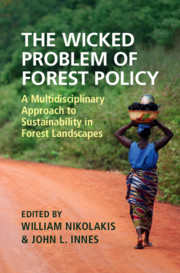 The Wicked Problem of Forest Policy
The Wicked Problem of Forest Policy Book contents
- The Wicked Problem of Forest Policy
- The Wicked Problem of Forest Policy
- Copyright page
- Contents
- Contributors
- 1 The Wicked Problem of Forest Policy
- Part I Wicked Problems and Policies
- 2 Why Forests Matter?
- 3 Forest Certification and Forest Use
- 4 REDD+ Meets Local Realities
- 5 Have Payments for Ecosystem Services Delivered for the Rural Poor?
- 6 Tackling Gender Inequality through Forest-Related Policies and Programmes
- 7 Forestry Crimes and Our Planet
- 8 Forest Bioeconomy Development
- Part II Tools to Address Wicked Problems
- Index
- References
4 - REDD+ Meets Local Realities
from Part I - Wicked Problems and Policies
Published online by Cambridge University Press: 24 July 2020
- The Wicked Problem of Forest Policy
- The Wicked Problem of Forest Policy
- Copyright page
- Contents
- Contributors
- 1 The Wicked Problem of Forest Policy
- Part I Wicked Problems and Policies
- 2 Why Forests Matter?
- 3 Forest Certification and Forest Use
- 4 REDD+ Meets Local Realities
- 5 Have Payments for Ecosystem Services Delivered for the Rural Poor?
- 6 Tackling Gender Inequality through Forest-Related Policies and Programmes
- 7 Forestry Crimes and Our Planet
- 8 Forest Bioeconomy Development
- Part II Tools to Address Wicked Problems
- Index
- References
Summary
REDD+ (reduced emissions from deforestation and forest degradation) was introduced as a key policy measure to mitigate global climate change in tropical forests. REDD+ is framed as an incentive-driven payment for ecosystem services (PES) programmes for carbon sequestration and storage. REDD+ is also performance-based and demands substantial institutional change. Implementing REDD+ implies engaging and confronting several interests, creating complex and wicked problems for policy-makers. This chapter analyzes REDD+ in Kilosa, Tanzania; the ‘Bolsa Floresta’ project in the State of Amazonas, Brazil; and in the Bikoro, Equateur Province of the Democratic Republic of Congo (DRC). Forests are important to livelihoods in each of these contexts, but they vary in power structure and history. These variations aside, the three cases offer an opportunity to learn about the challenges REDD+ has encountered ‘on the ground’.
- Type
- Chapter
- Information
- The Wicked Problem of Forest PolicyA Multidisciplinary Approach to Sustainability in Forest Landscapes, pp. 108 - 138Publisher: Cambridge University PressPrint publication year: 2020
